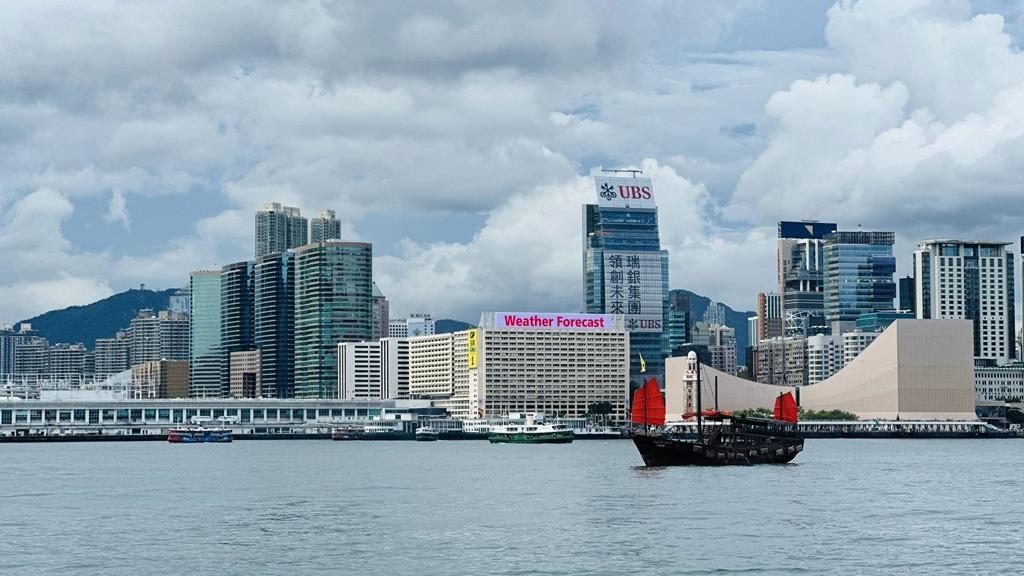 Chinese traditional junk Dukling plies the Victoria Harbour in hong Kong on September 7, 2023. (SHAMIM ASHRAF / CHINA DAILY)
Chinese traditional junk Dukling plies the Victoria Harbour in hong Kong on September 7, 2023. (SHAMIM ASHRAF / CHINA DAILY)
The Hong Kong General Chamber of Commerce said it is not a good time for the government of the Hong Kong Special Administrative Region to levy new taxes on businesses and taxpayers, as the city’s economy continues to face significant challenges amid the global economic malaise, high interest rates and geopolitical uncertainties.
“As the government of the Hong Kong Special Administrative Region is facing immense financial pressure, it should adopt a multipronged approach to ensure economic stability as well as maintain the prudence of public finances,” said Agnes Chan, deputy chairman of Hong Kong’s oldest business chamber representing multinational companies.
CPA Australia said the SAR government should not raise the profits and salaries tax rate to boost government revenues and should instead enhance the city’s overall attractiveness to companies, investment and talents
“The government should manage its finances prudently. On the one hand, it should provide financial relief to enterprises and taxpayers while ensuring that financial help should be made targeted,” the HKGCC deputy chairman said in the Tuesday news conference.
READ MORE: HK starts market consultation on global minimum tax
The HKGCC recommends the SAR government conduct a thorough review to mull whether any new broad-based taxes can be introduced to rein in the soaring budget deficit.
Wayne Lau, chairman of the HKGCC’s taxation committee, suggested the administration introduce a 3-percent to 5-percent digital services tax on revenues generated in the city by non-Hong Kong-based service providers, in the second half of this year.
The suggested scope of taxation includes revenues generated through online advertising, social media platforms, search engines, apps fairs, as well as content streaming and sharing.
“In addition to providing additional revenues to the government, the proposal can create a more level playing field business environment for local digital businesses,” Lau said.
Based on the revenue level of online services in 2023, a 5-percent digital services tax can bring up to HK$1.5 billion ($191.75 million) in additional revenue to the government, Lau estimated.
Meanwhile, CPA Australia said the SAR government should not raise the profits and salaries tax rate to boost government revenues and should instead enhance the city’s overall attractiveness to companies, investment and talents.
“The government should devote its financial resources to three targeted areas: creating more economic growth engines, promoting economic transformation through digitalization, and helping Hong Kong enterprises to find more markets,” Anthony Lau, co-chairperson of CPA Australia’s Greater China taxation committee, said in the news conference.
The professional accounting body also estimates the government’s fiscal reserves will fall to HK$708 billion at the end of March, compared with HK$834.8 billion at the end of March 2023
The professional accounting body also said the government should not levy a capital gains tax or a land departure tax now because the former proposal goes against its policy of attracting capital and talents; while the latter recommendation is not conducive to enhancing the flows of talents, goods and capital in the Guangdong-Hong Kong-Macao Greater Bay Area.
But CPA Australia recommended that the government mull whether to levy a carbon tax starting from 2026 and study the feasibility of introducing a sales tax. “The carbon tax proposal can help reduce greenhouse gas emissions by corporations while the sales tax suggestion can open up more tax revenues channel for the government,” Lau said.
Karina Wong, CPA Australia’s divisional deputy president and deputy chairman of the taxation committee, recommended the administration commission a comprehensive root and branch review of the tax system to mull every possible source of raising revenues.
“The review should be based on the overall economic development trend, economic development goal and the city’s social patterns,” Wong noted.
READ MORE: HK deficit seen almost two times larger than forecast
CPA Australia projects the SAR will record a budget deficit of HK$127 billion for the 2023-24 financial year, 133 percent higher than the government’s original forecast of HK$54.4 billion made in February 2023.
The professional accounting body also estimates the government’s fiscal reserves will fall to HK$708 billion at the end of March, compared with HK$834.8 billion at the end of March 2023.
In the first nine months of the 2023-24 financial year (April to December 2023), the administration registered a cumulative budget deficit of HK$142.3 billion after taking into account HK$66.6 billion in proceeds from green bond issuances. In the last financial year (2022-23), the administration incurred a budget deficit of HK$122.3 billion.


